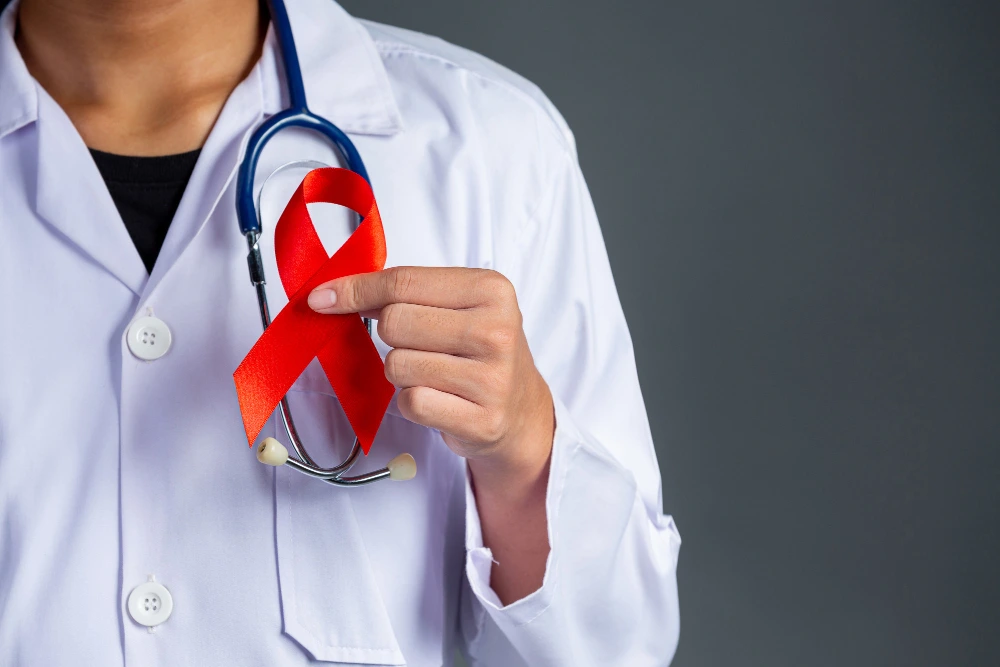Imagine facing a diagnosis that brings with it not only health concerns but also the weight of societal stigma, fear of rejection, and the daunting task of navigating personal relationships under the shadow of the virus.
Living with human immunodeficiency virus (HIV) is not just a physical battle. Here’s a closer look at its psychological impact.
How can HIV impact you emotionally?
From fear and stigma to anxiety and loneliness, managing the emotional challenges of HIV can be just as demanding as addressing the physical ones.
Here are some of the most common experiences that you’ll go through when living with HIV.
1. Fear of stigma and discrimination
One of the most significant emotional burdens of HIV is the fear of stigma and discrimination. Misconceptions about the virus often lead to judgment and exclusion from others. This societal pressure can make you worry about how friends, family, and colleagues might react if they learn about your diagnosis, which may impact your confidence in social settings and overall mental health.
2. Anxiety about disclosing HIV status
Deciding whether to disclose your HIV status is a deeply personal and often anxiety-inducing choice. Fear of rejection, strained relationships, or even harm can make the thought of sharing your status overwhelming. This anxiety can create a barrier to forming new relationships or maintaining existing ones, leaving you feeling isolated and misunderstood.
3. Worries about health and treatment
Living with HIV naturally brings concerns about your health and future. You might find yourself questioning how the virus will affect your physical well-being, how long you’ll live, or whether your treatment will remain effective.
These uncertainties can lead to significant stress and anxiety, particularly when dealing with the long-term nature of HIV management. Additionally, the fear of potentially transmitting the virus to others can weigh heavily, which sometimes causes guilt and self-blame.
4. Coping with the diagnosis and its permanence
Accepting the permanence of the condition often involves grieving the loss of your previous sense of normalcy. You may feel overwhelmed by the thought of living with a chronic illness, which can lead to feelings of hopelessness and depression. The ongoing nature of the condition can make it challenging to find peace or optimism about the future.
5. Isolation and loneliness
Fear of stigma, discrimination, or rejection might cause you to withdraw from social interactions. Without a strong support system, it can be difficult to find the encouragement and connection you need to maintain emotional resilience.
6. Depression and emotional distress
The combined weight of living with HIV—coping with stigma, health concerns, and the permanence of the diagnosis—can lead to depression. If you have this, you may experience the following:
- Struggling to find joy in daily life
- Feeling disconnected from others
- Feeling a lingering sadness about how the condition has altered your life and future
What are common emotional responses to an HIV diagnosis?
Receiving an HIV diagnosis triggers a range of responses that shift over time as you process the news. While everyone copes differently, most people go through three key phases when adjusting to their diagnosis.
1. Shock and denial
The initial response to an HIV diagnosis often involves shock and denial. This stage is characterized by disbelief, as the news may feel too overwhelming to fully comprehend. You may experience numbness or detachment, unable to accept the reality of your condition.
Denial serves as a defense mechanism as it provides temporary relief from the emotional impact. While this reaction can offer some protection in the short term, it may delay necessary actions for managing the diagnosis in the long run.
2. Anger and bargaining
As the reality of the diagnosis begins to sink in, you may start feeling angry with yourself or external circumstances, including self-blame or anger toward those who may have contributed to the situation.
The emotional struggle often includes thoughts of wishing to reverse past actions or decisions. You may also catch yourself attempting to make sense of the “what ifs.”
3. Acceptance and hope
With time, information, and support, you’ll eventually reach a stage of acceptance and hope. This phase involves acknowledging the reality of living with HIV and focusing on health and well-being rather than dwelling on past choices.
The shift to acceptance brings optimism about managing the condition, as medical advancements offer effective treatments that allow people living with HIV to lead long and fulfilling lives.
How can you cope with the emotional impact of HIV?
Here are different things you can do to cope with HIV’s emotional impact.
1. Seek social support
Surround yourself with friends and family or join support groups that can provide the emotional safety needed to navigate the challenges of the condition.
Your support system can empathize, understand, and provide you with a sense of community that counters feelings of isolation. Sharing experiences and coping strategies in group settings can also inspire new ways of managing emotions and help you feel less alone in your journey.
2. Engage in counseling or therapy
A therapist can guide you through processing emotions like fear, guilt, and sadness while equipping you with coping strategies for stress and anxiety. In a safe and confidential space, you can gain emotional clarity and self-awareness.
Additionally, a therapist can help you with maintaining emotional balance and building resilience through mindfulness and cognitive-behavioral strategies.
3. Educate yourself about HIV
You can make informed decisions and feel more confident about your future by educating yourself about the following:
- The virus
- Your treatment options
- Ways to stay healthy
Understanding how effective treatments work and how to incorporate them into your daily routine helps you maintain a sense of control and optimism. You can also learn about healthy lifestyle habits, such as regular exercise and stress management, to improve your overall quality of life.

How can healthcare providers help you cope with living with HIV?
Beyond addressing the physical aspects of the condition, they provide emotional support, foster open communication, and connect patients with resources to promote mental well-being.
1. They offer emotional support.
Healthcare providers create a safe and nonjudgmental environment where patients can openly express their feelings, whether it’s fear, frustration, or sadness. This safe space fosters trust and allows you to discuss your concerns without fear of judgment.
2. They connect patients to resources.
Healthcare providers often refer patients to mental health professionals, such as psychologists or psychiatrists, for specialized care. They also connect you with support groups and community resources, where you can find camaraderie and coping strategies from others who understand your experience.
3. They engage in open communication..
Openly discussing your emotional well-being is a key part of comprehensive HIV care. By listening to your concerns and validating your feelings, healthcare providers help build trust, reduce stress, and help you to take charge of your health and overall well-being.
Frequently asked questions
How does living with HIV affect mental health?
Living with HIV can lead to significant emotional and mental health challenges, including anxiety, depression, fear of stigma, and feelings of isolation. You may find yourself worrying about your health, the effectiveness of treatment, and how the diagnosis will impact your future. These concerns are valid, but with the right support and resources, you can manage both your emotional well-being and your physical health.
What are some common emotional responses to an HIV diagnosis?
Common emotional responses include shock, denial, anger, bargaining, and eventually acceptance and hope. These stages reflect the natural emotional processing of receiving such a life-changing diagnosis. It’s important to understand that everyone’s journey is unique, and these emotions can evolve over time.
Why is social support important for someone living with HIV?
Social support plays a key role in helping you cope with the emotional burden of HIV. Surrounding oneself with friends and family or joining support groups provides a sense of belonging and understanding.
What can healthcare providers do to support the emotional health of HIV patients?
Healthcare providers offer emotional support by creating a safe space for patients to express their feelings, providing referrals to mental health professionals, and encouraging open communication about emotional struggles.
How can therapy or counseling help someone living with HIV?
Therapy and counseling provide a confidential space for you to process your emotions, such as fear, guilt, or sadness. Mental health professionals can offer coping strategies, such as cognitive-behavioral techniques, that help manage stress and anxiety.
Key takeaway
Living with HIV impacts your overall well-being, affecting not just your physical health but also your mental and emotional state. Fear, stigma, and isolation can weigh heavily on you.
If you’re living with HIV, seeking support, engaging in counseling, and maintaining open communication with healthcare providers can help you navigate the emotional journey. By prioritizing both emotional and physical care, you can take control of your health and continue to lead a fulfilling life.




















































